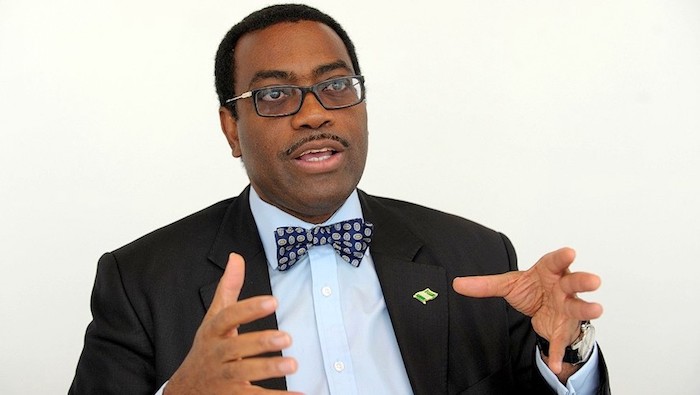The African Development Bank (AfDB), Islamic Development Bank (IDB) and the International Fund for Agricultural Development (IFAD), have voted $1 billion to further deliver Special Agro-industrial Processing Zones in 24 States of Nigeria.
This is in addition to an initial $520 million voted by the development partners for the development of eight special agro-industrial processing zones in Nigeria.
President of African Development Bank Group, Dr. Akinwumi A. Adesina, made this disclosure at the on-going Norman Borlaug International Dialogue, World Food Prize 2023, in Des Moines, Iowa, United States of America.
Delivering his address titled, “From Dakar to Des Moines,” Adesina noted that the decision to pump such huge funds into Nigeria’s agribusiness was part of the resolve to develop Special Agro-Industrial Processing Zones (SAPZs) in 13 countries.
Explaining that it was the core of the food and agriculture delivery compacts from the Dakar 2 Summit held earlier this year in Dakar, Senegal, the AfDB President said, “We are investing heavily in the development of SAPZs to support the development of agricultural value chains, food processing and value addition, enabling infrastructure and logistics to promote local, regional, and international trade in food.
“The African Development Bank Group is investing $853 million in the development of the Special Agro-Industrial Processing Zones, and it has mobilized additional co-financing of $661 million, for a total commitment of $1.5 billion. We are deploying effective partnerships at scale. We are currently implementing 25 Special Agro-industrial Processing Zones in 13 countries.
“For example, the African Development Bank, Islamic Development Bank, and the International Fund for Agricultural Development provided $520 million for the development of eight special agro-industrial processing zones in Nigeria. The second phase of the program aims to mobilize an additional $1 billion to deliver special agro-industrial processing zones in 24 States of Nigeria”.
Adesina regretted that while much progress had “been made in African agriculture, 283 million people still go to bed hungry in Africa, about a third of the 828 million people that suffer hunger globally.”
He however described the Norman Borlaug International Dialogue World Food Prize 2023, as a “journey and narrative of how we are combining the power of science, technology, policies, and politics to ensure that Africa fully unlocks its agricultural potential, and feeds itself, with pride.”
The AfDB President thanked Vice President Kashim Shettima, and the President of Ethiopia, Sahle-Work Zewde, for participating in the global event, saying their presence is an indication “that Africa has the political will and is fully ready to tackle food insecurity and make hunger history” on the continent.
Also speaking during the sideline chat with the AfDB President, Vice President Shettima who spoke on the Tinubu administration’s initiatives for food security said the quality of present leadership in Nigeria and the rest of Africa will drive transformation in agriculture and other sectors.
According to him, “a nation falls or rises fundamentally due to the quality of its leadership. Right now Africa is blessed with quite a handful of quality leaders that have the drive, passion and skills set to redefine the meaning and concept of modern leadership.
“Bola Ahmed Tinubu, my boss, is a good example, Macky Sall of Senegal and of course, Abdel Fattah El-Sisi of Egypt are doing wonderfully well, just to mention a few of the African leaders that are distinguishing themselves in leadership.
“I want to assure this gathering of investors and stakeholders in the agricultural sector that my boss, President Tinubu is a quintessential 21st century modern African leader who is determined to redefine the meaning and concept of modern leadership.
“Be rest assured that there will be a sea change in the fortunes of the Nigerian nation and by extention the African continent in the next couple of years because Nigeria is an anchor nation”.
On wheat production, Shettima disclosed that “our target towards wheat production in Nigeria is to achieve 50% self sufficiency in the next three cycles. It is inconceivable that we are the second largest wheat importer in the world.
“Luckily, we have already procured the heat tolerant variety of wheat seeds and we are going to drive that process by supporting the farmers with the heat tolerant variety, agricultural extention services, fertilizer and also hope to increase the irrigation areas to one million hectares in the next cropping cycle.
“We need to produce about 2.4 million tonnes of wheat grains in Nigeria. We are going to reach out to our farmers through small irrigation schemes and through digitalisation. All the actors in the value chain will be sufficiently taken care of through innovative finance, partial credit guarantees and crop insurance,” he emphasized.
For rice production, the Vice President said the major challenge for Nigeria is the insufficiency of paddy rice and noted that Nigeria has adequate milling capacity but “we need to produce three to four million tonnes of paddy rice to meet our requirement of about 2.5 million tonnes per annum. We have 75 million hectares of arable land and most of it suited for rice cultivation.”
He added that “we will provide our farmers with certified seeds, fertilzer, extension services, the digitlization of services, inputs, finance and market information. Our target is to achieve self sufficiency in rice latest by 2027.”
Shettima also spoke about the Special Agro-Industrial Processing Zones (SAPZs), reiterating the Tinubu administration’s commitment to providing an enabling environment for investors in the zones.
He said government would create an SAPZ development authority that will operate like a one-stop shop where regulatory and associated issues will be addressed.










